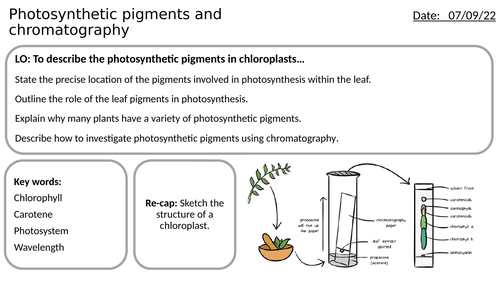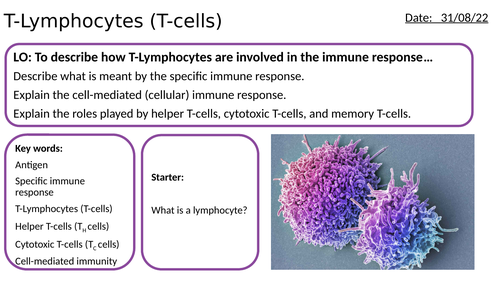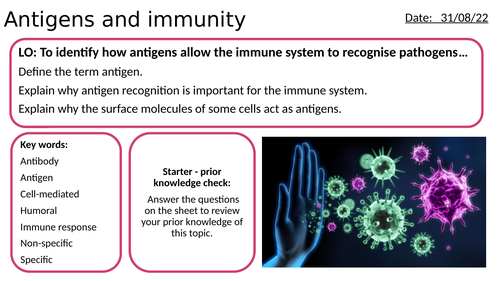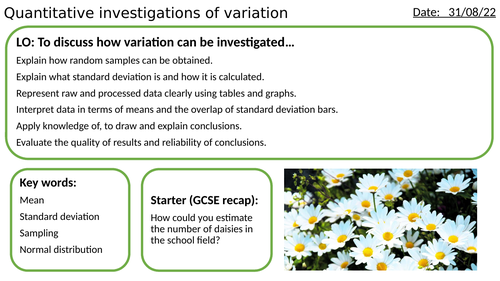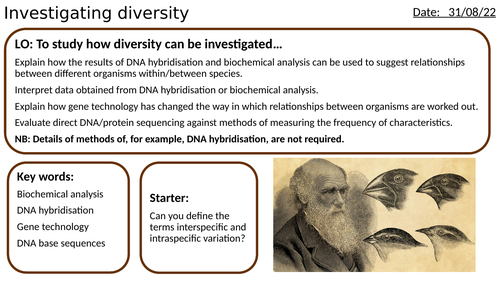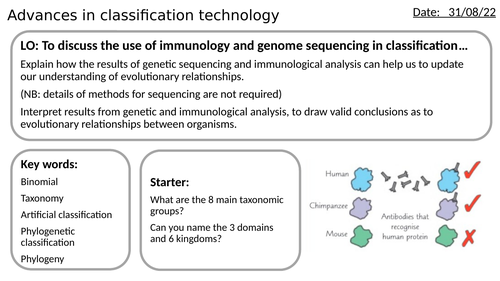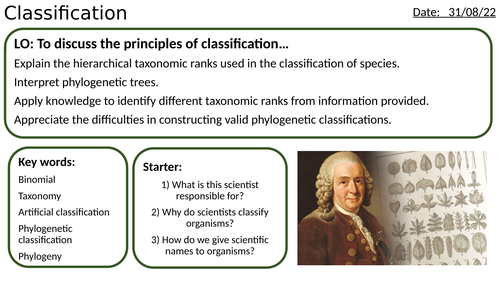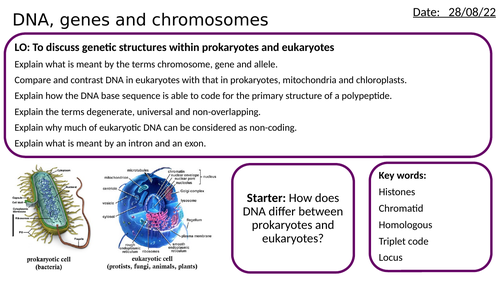66Uploads
17k+Views
13k+Downloads
Biology

AS/A2-Level AQA Biology Light independent reaction of photosynthesis Full Lesson
A full lesson on Light independent reaction of photosynthesis, covering the following LOs…
Explain where the light-independent reaction occurs.
Describe the Calvin cycle.
Explain the roles of reduced NADP and ATP.
Interpret experimental data about the light independent reaction.
Lesson includes starter task and practice exam questions (with mark scheme).

AS/A2-Level AQA Biology Light dependent reaction of photosynthesis Full Lesson
A full lesson on Light dependent reaction of photosynthesis, covering the following LOs…
Explain where, specifically, the light-dependent reaction occurs.
Explain the role of light in photolysis and photoionisation.
Explain how photoexcited electrons move along the electron transfer chain, and how ATP and reduced NADP are produced.
Explain chemiosmosis and the role of ATP synthase in producing ATP.
Lesson includes starter task and practice exam questions (with mark scheme).

AS/A2-Level AQA Biology Photosynthetic Pigments and Chromatography Full Lesson
A full lesson on Photosynthetic Pigments and Chromatography, covering the following LOs…
State the precise location of the pigments involved in photosynthesis within the leaf.
Outline the role of the leaf pigments in photosynthesis.
Explain why many plants have a variety of photosynthetic pigments.
Describe how to investigate photosynthetic pigments using chromatography.
Lesson includes starter task, two sets of practice exam questions (and mark schemes), practical questions, and student sheet for Required Practical 7 - Use of chromatography to investigate the pigments isolated from leaves of different plants.

AS/A2-Level AQA Biology Chloroplast Structure Full Lesson
A full lesson on Chloroplast Structure, covering the following LOs…
Describe the structure of chloroplasts.
Explain how the structure of a chloroplast is linked to it’s function.
Lesson includes starter task and practice exam questions (with mark scheme).

AS/A2-Level AQA Biology Antibodies Immune System Immunity Full Lesson
A full lesson on Antibodies, covering the following LOs…
Describe the structure of antibodies.
Explain the specificity of an antibody to a particular antigen.
Explain how antibodies lead to the destruction of pathogens.
Lesson includes starter task, lesson worksheet, and practice exam questions (and mark scheme).

AS/A2-Level AQA Biology Carbohydrates Monosaccharides Disaccharides Polysaccharides Full Lesson
A full lesson on Carbohydrates, covering the following LOs…
Describe the structures of monosaccharides, such as glucose and ribose.
Explain the condensation and hydrolysis of disaccharides and polysaccharides.
Analyse the structure and properties of polysaccharides, such as Starch, Glycogen, and Cellulose.
Lesson includes starter task, practice exam questions (with mark scheme), and plenary.

AS/A2-Level AQA Biology T-Lymphocyte T-cell Cell-Mediated Immunity Immune System Full Lesson
A full lesson on T-Lymphocytes, covering the following LOs…
Describe what is meant by the specific immune response.
Explain the cell-mediated (cellular) immune response.
Explain the roles played by helper T-cells, cytotoxic T-cells, and memory T-cells.
Lesson includes starter task, and plenary (application questions and answers).

AS/A2-Level AQA Biology Phagocytosis Phagocyte Non-Specific Immune System Full Lesson
A full lesson on Phagocytosis, covering the following LOs…
Describe the process of phagocytosis.
Explain the role of lysozymes in the destruction of pathogens.
Explain the role of antigen presentation following destruction.
Lesson includes starter task, application questions (with answers), and practice exam questions (and mark scheme).

AS/A2-Level AQA Biology Antigens and Immunity Full Lesson
A full lesson on Antigens and Immunity, covering the following LOs…
Define the term antigen.
Explain why antigen recognition is important for the immune system.
Explain why the surface molecules of some cells act as antigens.
Lesson includes starter task (prior knowledge check questions and answers), and practice exam questions (and mark scheme).
Bundle

AS/A2-Level AQA Biology - Topic 4: Genetic Information, Variation & Relationships between Organisms *14 LESSON BUNDLE*
AS/A2-Level AQA Biology - Topic 4: Genetic Information, Variation & Relationships between Organisms 14 LESSON BUNDLE
INCLUDES THE FOLLOWING LESSONS…
DNA, genes and chromosomes
Protein synthesis - transcription
Protein synthesis - translation
Gene and chromosome mutations
Meiosis and genetic variation
Genetic diversity and adaptation
The effects of selection
RP6 Investigating selection aseptic technique antibiotics bacterial growth
Classification (phylogeny, taxonomy)
Advances in classification technology
Species (courtship displays/behaviour)
Biodiversity (within a community)
Investigating diversity
Quantitative investigations of diversity
Individual lessons worth £39! Save 33% by buying the bundle.

AS/A2-Level AQA Biology Quantitative Investigations of Diversity Full Lesson
A full 60 minute lesson on Quantitative Investigations of Diversity, covering the following LOs…
Explain how random samples can be obtained.
Explain what standard deviation is and how it is calculated.
Represent raw and processed data clearly using tables and graphs.
Interpret data in terms of means and the overlap of standard deviation bars.
Apply knowledge of, to draw and explain conclusions.
Evaluate the quality of results and reliability of conclusions.
Lesson includes starter task, recall questions (and answers), and also practice exam questions (and mark scheme).

AS/A2-Level AQA Biology Investigating Diversity Full Lesson
A full lesson on Investigating Diversity, covering the following LOs…
Explain how the results of DNA hybridisation and biochemical analysis can be used to suggest relationships between different organisms within/between species.
Interpret data obtained from DNA hybridisation or biochemical analysis.
Explain how gene technology has changed the way in which relationships between organisms are worked out.
Evaluate direct DNA/protein sequencing against methods of measuring the frequency of characteristics.
Lesson includes starter task, and practice exam questions (and mark scheme).

AS/A2-Level AQA Biology Biodiversity (within a community) Full Lesson
A full 60 minute lesson on Biodiversity (within a community), covering the following LOs…
Explain what is meant by the terms biodiversity, species richness and index of diversity.
Calculate the index of diversity when supplied with relevant information.
Interpret information and draw conclusions from the index of diversity for different habitats.
Explain how farming techniques impact on biodiversity and the reason why these techniques are used.
Evaluate conservation techniques and why these must be balanced with farming.
Lesson includes starter task, recall questions (and answers), and also practice exam questions (and mark scheme).

AS/A2-Level AQA Biology Species (Courtship Displays/Behaviour) Full Lesson
A full 60 minute lesson on Species (Courtship Displays/Behaviour), covering the following LOs…
Explain what a species is.
Appreciate the difficulties in defining the term species.
Explain the role of courtship and why it is necessary.
Interpret information and data relating to courtship displays.
Lesson includes starter task, class discussion, and practice exam questions (and mark scheme).

AS/A2-Level AQA Biology Advances in Classification Technologies Full Lesson
A full lesson on Advances in Classification Technologies, covering the following LOs…
Explain how the results of genetic sequencing and immunological analysis can help us to update our understanding of evolutionary relationships.
Interpret results from genetic and immunological analysis, to draw valid conclusions as to evolutionary relationships between organisms.
Lesson includes starter task, and practice exam questions (and mark scheme).

AS/A2-Level AQA Biology Classification (Phylogeny, Taxonomy) Full Lesson
A full 60 minute lesson on Classification, covering the following LOs…
Explain the hierarchical taxonomic ranks used in the classification of species.
Interpret phylogenetic trees.
Apply knowledge to identify different taxonomic ranks from information provided.
Appreciate the difficulties in constructing valid phylogenetic classifications.
Lesson includes starter task, links to GCSE biology, summary questions (and answers), recap questions (and answers), and also practice exam questions (and mark scheme).

AS/A2-Level AQA Biology Protein Synthesis - Translation Full Lesson
A full lesson on Translation (Protein Synthesis), covering the following LOs…
Explain the process of translation.
Explain the specific roles of ribosomes, ATP and tRNA in translation.
Describe the structure of tRNA and how it is related to its function.
Relate the base sequence of nucleic acids to the amino acid sequence of polypeptides, when provided with suitable data about the genetic code.
Lesson includes starter task, summary questions (and answers), and practice exam questions (and mark scheme).

AS/A2-Level AQA Biology Protein Synthesis - Transcription Full Lesson
A full lesson on Transcription (Protein Synthesis), covering the following LOs…
Explain what the terms genome and proteome mean.
Describe the structure of mRNA and how it is related to its function (link to biological molecules topic).
Explain the process of transcription in prokaryotes.
Explain the process of transcription and splicing in eukaryotes, linking this to knowledge of introns.
Interpret data from experimental work investigating the role of nucleic acids.
Lesson includes starter task and summary questions (and answers).

AS/A2-Level AQA Biology DNA, Genes and Chromosomes Full Lesson
A full 60 minute lesson on DNA, Genes and Chromosomes, covering the following LOs…
Explain what is meant by the terms chromosome, gene and allele.
Compare and contrast DNA in eukaryotes with that in prokaryotes, mitochondria and chloroplasts.
Explain how the DNA base sequence is able to code for the primary structure of a polypeptide.
Explain the terms degenerate, universal and non-overlapping.
Explain why much of eukaryotic DNA can be considered as non-coding.
Explain what is meant by an intron and an exon.
Lesson includes starter task, summary questions (and answers), and practice exam questions (and mark scheme).

AS/A2-Level AQA Biology Lipids Triglycerides Phospholipids Emulsion Test Full Lesson
A full lesson on Lipids, covering the following LOs…
Describe the structure of a triglyceride.
Recognise saturated or unsaturated fatty acids.
Describe the formation of a triglyceride.
Explain how the structures of triglycerides are related to their function.
Describe the structure of a phospholipid.
Explain how the structures of phospholipids are related to their function.
Describe the test for lipids.
Lesson includes starter task, quick check questions, plenary (do now task), and also an emulsion test student practical worksheet.



